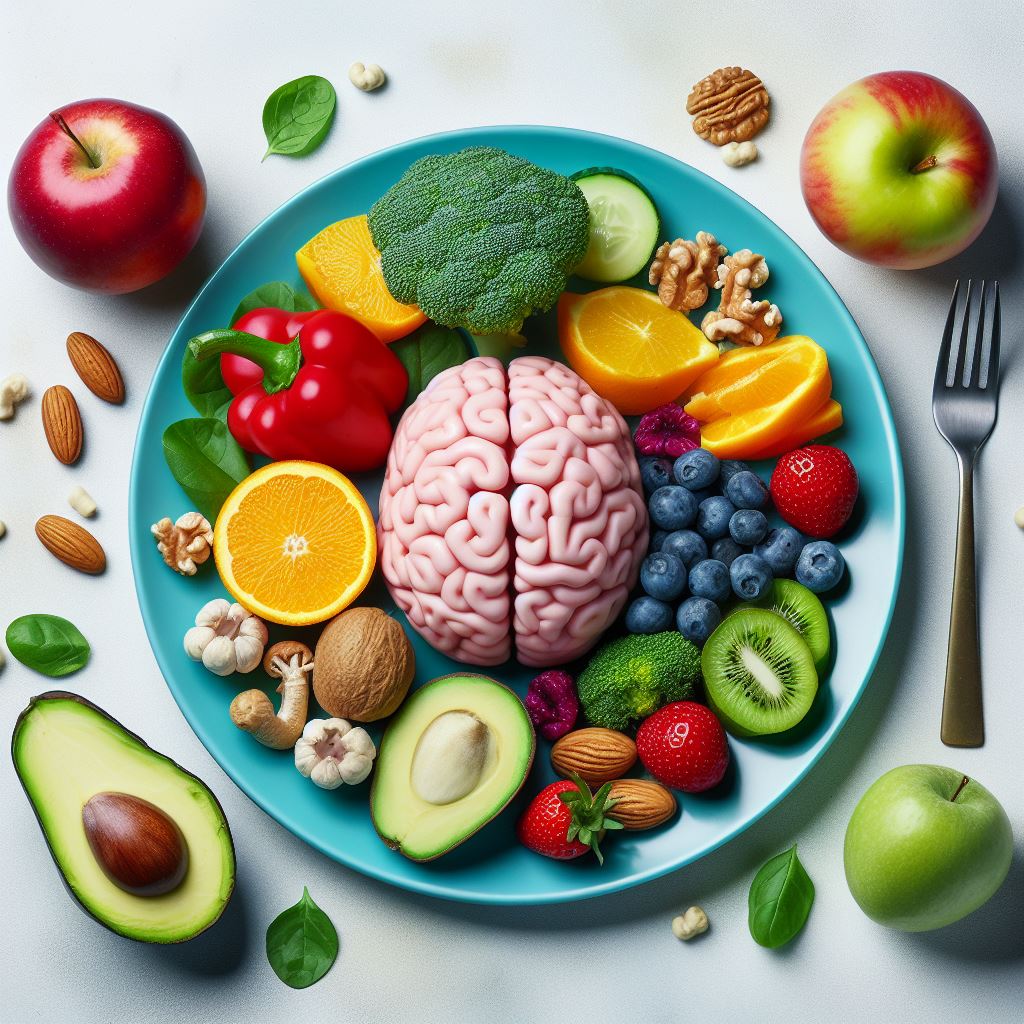Reading time: 10 minutes
Discover Which Super-Powerful Foods Can Boost Your Memory and Protect Your Brain from Cognitive Decline
Reading Time: 7 minutes
The relationship between nutrition and brain health is crucial for optimizing cognitive functions and preserving memory throughout life. A balanced diet, rich in specific nutrients, can play a significant role in preventing neurodegenerative diseases and promoting mental well-being.
Table of Contents
- Essential Nutrients for the Brain
- Feeds for Memory
- The Science Behind Brain Nutrition
- Conclusion
- Disclaimer
- References
Essential Nutrients for the Brain
Omega-3 Fatty Acids
Omega-3 fatty acids, found in fish such as salmon, tuna, and sardines, are essential for brain health. DHA (docosahexaenoic acid), a type of omega-3, is especially important for brain function and memory.
Antioxidants
Colorful fruits and vegetables, such as blueberries, strawberries, spinach, and broccoli, are rich in antioxidants that fight oxidative stress and protect brain cells from damage.
B Complex Vitamins
Vitamins such as B12, folic acid (B9), and B6 play a crucial role in brain health by assisting in the production of neurotransmitters essential for cognitive function.
Minerals
Magnesium, zinc, and selenium are important minerals for the proper functioning of the brain and the transmission of signals between neurons.
Feeds for Memory
Including specific foods in your daily diet can directly benefit brain function and memory:
Omega-3-Rich Fish
Eat omega-3-rich fish at least twice a week to promote brain health and reduce the risk of cognitive impairment.
Green Leafy Vegetables
Include green leafy vegetables, such as spinach and cabbage, in your meals to get a dose of antioxidants and essential nutrients.
Nuts, Seeds, and Avocados
Add nuts, seeds, and avocados to your diet to provide healthy fats and nutrients that support brain health.
The Science Behind Brain Nutrition
Scientific studies highlight the importance of nutrition in preserving memory and reducing the risk of neurodegenerative diseases. The antioxidants found in natural foods can neutralize the free radicals associated with brain aging, while omega-3 fatty acids promote neuronal plasticity and communication between neurons.
Brain health and memory can be significantly enhanced with proper natural supplementation, which aims to stimulate brain neurotransmitters and synapses. The combination of nutrients such as biotin, glutamine, beta-carotene, L-glutamine, cranberry root extract, blueberry extract, N-acetyl-L-tyrosine, DHA (docosahexaenoic acid), phosphatidylserine, vanadyl sulfate, magnesium, calcium, cinnamon peel extract, grapefruit seed extract, molybdenum, inositol, iron, manganese, choline, DMAE (dimethylaminoethanol), boron, zinc, vitamin B5, huperzine A, and bacopa is essential for maintaining brain health and improving cognitive function.
Key Nutrients and Their Benefits:
- Biotin: Plays an important role in the energy metabolism of the brain, assisting in the production of neurotransmitters.
- Glutamine: An amino acid that supports the central nervous system’s function, helping in neurotransmission and mood regulation.
- Beta-Carotene: A precursor of vitamin A, it protects brain cells from oxidative stress.
- L-Glutamine: Essential for brain function, aiding in neurotransmitter synthesis and nerve cell health.
- Cucumber Root and Blueberry Extracts: Provide antioxidant and anti-inflammatory properties to protect the brain and improve cognitive function.
- N-Acetyl-L-Tyrosine: A precursor of neurotransmitters important for attention and focus.
- DHA: Essential for cell membrane structure and function in the brain.
- Phosphatidylserine: Maintains brain cell integrity and transmission of signals.
- Vanadyl Sulfate: Influences brain metabolism and glucose regulation.
- Magnesium and Calcium: Support nerve transmission and muscle function.
- Cinnamon Peel and Grapefruit Seed Extracts: Protect the brain against oxidative stress and inflammation.
- Molybdenum, Inositol, Iron, and Manganese: Support neurotransmitter production and brain enzymes.
- Choline: Crucial for acetylcholine synthesis, important for memory and learning.
- DMAE: May promote cognitive function and cell membrane health.
- Boron: Plays a role in brain function and bone health.
- Zinc: Essential for neurotransmitter synthesis and mood regulation.
- Vitamin B5: Necessary for coenzyme production involved in neurotransmitter synthesis.
- Huperzine A and Bacopa: Known for their potential effects on improving memory and cognition.
Supplementation with these nutrients can help promote brain health, support cognitive function, and protect against age-related decline. Always consult a healthcare professional before starting any supplementation regimen.
HERE you can access the only and most revolutionary natural supplement that contains 35 elements necessary to leave your brain sharp.
Increase Your Memory
Do you want to sharpen your focus and increase your memory? Do you wish to increase your learning speed and your ability to solve problems? Or do you want to avoid the cognitive decline that comes with age?
You see, most people have brain fog and often can’t concentrate on their tasks at work. They find themselves getting more forgetful or misplacing items frequently. It’s as if they are losing their minds slowly but surely. Maybe you feel the same way. It’s like your brain doesn’t work the way it used to. You can’t focus, be creative, or solve problems.
You feel like you’re being left behind at work by people who seem to have supercomputers in their brains. To make matters worse, you forget things a lot and lose things only to find you are holding what you’re looking for.
This scares you. You’re afraid of what will happen to your brain health and power as you age. Yet, you get the sense that you can improve your health and boost your brain power. But you don’t know how to do so. So look at this before it’s too late.
Conclusion
Investing in a balanced diet rich in beneficial nutrients for the brain is essential to maintain sharp memory and promote brain health throughout life. Small changes in diet can have a significant impact on cognitive function and mental well-being.
Recommended Reading
Unlocking Your Mind’s Potential: The Secrets of Natural Supplementation
Zen Memory: Meditation and Supplementation for Focus and Concentration
Products Referenced in the Text:
- Breathing for Sleep – Digital Product
- Inapeace
- NeuroZoom
- Superior Brain Health Video Guide
- Workoutpedia – Digital Product
- Yoga – Radiant Mastery: Yoga for Mature Age
References
- Carotene: Study: “Role of dietary and circulating beta-carotene in risk of acute myocardial infarction in a case-control study of women” (2019)
- Biotin – United States National Institute of Health (NIH) – “Biotin: Fact Sheet for Health Professionals” (2019)
- Blueberry extract – Review: “The Potential Role of Blueberries in the Prevention of Post-Traumatic Stress Disorder” (2016)
- Boron – Research on the role of boron in brain health (2018)
- Cinnamon peel extract – Study on the brain health benefits of cinnamon peel extract (2016)
- Cucumber root extract – Study on the antioxidant and anti-inflammatory effects of coriander root extract (2018)
- DHA (Docosahexaenoic Acid) – Article: “Docosahexaenoic acid supplementation increases prefrontal cortex activation during sustained attention in healthy boys: a placebo-controlled, dose-ranging, functional magnetic resonance imaging study” (2019)
- Dietary patterns and cognitive decline in an older Australian population. Author: McEvoy CT, et al. (Year of publication: 2017)
- DMAE (Dimetylethanolamine) – Study: “Dimethylaminoethanol affects the viability of human neuronal cells in vitro” (2016)
- Glutamine – Reassessment of the role of glutamine in regulating metabolism and cell proliferation (2018); Article: “Glutamine and Glutamate in the Brain” (2017)
- Grapefruit seed extract – Research: “Grapefruit-seed extract as a potential treatment for brain and spinal cord injury” (2018)
- Choline, the brain and neurodegeneration: Insights from epigenetics (2017)
- Huperzine A and Bacopa – Review: “Bacopa monnieri and Huperzine-A for Alzheimer’s Disease: A Systematic Review and Meta-Analysis of Randomized Controlled Trials” (2019)
- L-glutamine – Review: “Glutamine and Glutamate in Brain Function and Psychiatric Disease” (2019)
- Magnesium and calcium – Article: “The effects of magnesium supplementation on subjective anxiety and stress—a systematic review” (2017)
- Molybdenum, inositol, iron and manganese – Article: “Molybdenum in Human Health and Disease” (2019)
- N-acetyl-L-tyrosine – Study: “N-acetyl-l-tyrosine (NAT) supplementation influences hemodynamic and inflammatory responses to acute stress” (2017)
- Nutritional factors affecting mental health. Author: Sarris J, et al. (Year of publication: 2015)
- Omega-3 fatty acids and brain resistance to aging and stress: Body of evidence and possible mechanisms. Author: Cederholm T, et al. (Year of publication: 2013)
- Phosphatidylserine – Review: “The role of phosphatidylserine in brain functioning and its potential clinical applications in dementia” (2018)
- Vitamin B5 (Pantothenic Acid) – Study: “Pantothenic Acid as a Weight-Reducing Agent: Fasting Without Hunger” (2018)
- Zinc – Review: “Zinc and its importance for human health: An integrative review” (2019)
- Research on antioxidants and brain health (2017)
Disclaimer
This article provides information about brain nutrition, but it is important to always consult a nutritionist or health professional for personalized guidance.







